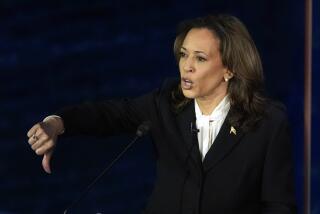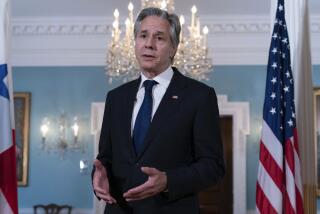Bush Urges IMF, World Bank to Do More to Speed Poland’s Recovery
- Share via
WASHINGTON — President Bush told the 152-nation International Monetary Fund today “we must do more” to help the new non-Communist government of Poland, citing “our self-evident stake in its success.”
The President urged the international lending organization, and its sister agency the World Bank, “to work rapidly with Poland” to help the nation restructure its economy.
The Bush Administration is supporting a $119-million package of U.S. economic aid to Poland and another $100 million in food aid with nothing more promised. Congressional critics are calling for more.
Bush told a group of reporters in the Oval Office after his speech that it is still too early to tell how much additional aid the United States might be willing to give to Poland.
“I think the key thing now is that the Poles themselves are working on a reform package,” Bush said. “We want to work with them in every way we can, but I think it’s important to see what their plan is for economic reform.”
Asked about an appeal by Poland today for a $1-billion loan from industrial nations, Bush said the 12-member European Community “is working on their side; we’ve been helpful on ours. So we’ll see what final figures are arrived at.”
“We’ll do everything we can. We are committed to the success for democracy in Poland,” he said.
On other matters, Bush said in his session with the reporters that there is “a good likelihood” he and Soviet President Mikhail S. Gorbachev will be able to sign a landmark treaty to slash the deadliest weapons in the superpowers’ nuclear arsenals at a summit meeting next year.
Bush said that the scheduling of a summit in late spring or early summer “will serve as a catalyst for moving forward on a treaty” and that it may be ready by the summit.
“It’s not absolutely certain that that’s going to happen but I would have to agree (there is) a good likelihood that might happen,” Bush said.
Bush’s statement put him in sync with an optimistic forecast by Soviet Foreign Minister Eduard A. Shevardnadze, who told the United Nations on Tuesday there are “realistic prospects” by the time of the summit for passing “the last turn” on the road to a strategic arms reduction treaty (START) to trim 30% to 50% from each nation’s arsenals of long-range nuclear missiles, bombers and submarines.
“I don’t want to set it up so that if we don’t have every ‘t’ crossed and ‘i’ dotted (on a treaty) that the summit . . . is considered a failure,” Bush said. But he said he agrees with Shevardnadze’s statement.
Bush held the news conference before flying to Charlottesville, Va., for a meeting with the nation’s governors to improve the country’s education system.
He said he was looking forward to a “candid and very free-flowing discussion” at the two-day meeting at the University of Virginia. Bush predicted the sessions would result in “strong consensus” for national educational goals, as well as in greater flexibility in the way states can use federal education aid.
Moreover, Bush said, “There’s a strong recognition among the governors that we need accountability for achieving results relating to the goals.”
More to Read
Sign up for Essential California
The most important California stories and recommendations in your inbox every morning.
You may occasionally receive promotional content from the Los Angeles Times.










